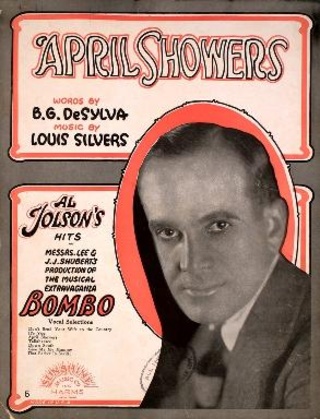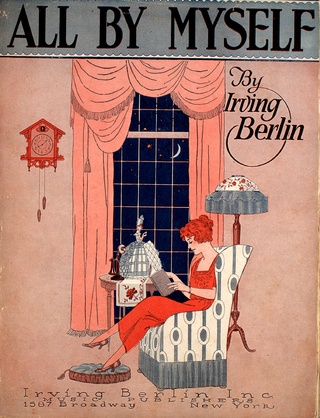Related Research Articles
"In the Cool, Cool, Cool of the Evening" is a popular song with music by Hoagy Carmichael and lyrics by Johnny Mercer. It was originally planned to feature it in a Paramount film written for Betty Hutton that never took off, which was to be called The Mack Sennett Girl. The song was buried in Paramount's files until it was rediscovered and then used in the 1951 film Here Comes the Groom and won the Academy Award for Best Original Song.
"Lullaby of Broadway" is a popular song with music written by Harry Warren and lyrics by Al Dubin, published in 1935. The lyrics salute the nightlife of Broadway and its denizens, who "don't sleep tight until the dawn."
"All Alone" is a popular waltz ballad composed by Irving Berlin in 1924. It was interpolated into the Broadway show The Music Box Revue of 1924 where it was sung by Grace Moore and Oscar Shaw. Moore sat at one end of the stage under a tightly focused spotlight, singing it into a telephone, while Oscar Shaw sat at the other, doing the same.
"Three Little Words" is a popular song with music by Harry Ruby and lyrics by Bert Kalmar, published in 1930.

"Moonlight Bay" is a popular song. It is commonly referred to as "On Moonlight Bay". The lyrics were written by Edward Madden, the music by Percy Wenrich, and was published in 1912. It is often sung in a barbershop quartet style. Early successful recordings in 1912 were by the American Quartet and by Dolly Connolly.

"I'll See You in My Dreams" is a popular song, composed by Isham Jones, with lyrics by Gus Kahn, and published in 1924. It was recorded on December 4 that year, by Isham Jones conducting Ray Miller's Orchestra. Released on Brunswick Records, it charted for 16 weeks during 1925, spending seven weeks at number 1 in the United States. Other popular versions in 1925 were by Marion Harris; Paul Whiteman; Ford & Glenn; and Lewis James; with three of these four reaching the Top 10.
"It's Easy to Remember " is a popular song written by Richard Rodgers with lyrics by Lorenz Hart.
"You Brought a New Kind of Love to Me" is a 1930 popular song. The credits list music and lyrics as written by Sammy Fain, Irving Kahal, and Pierre Norman. Since Fain was primarily a music writer and Kahal a lyricist, it may be assumed that the music was by Fain and lyrics were by Kahal, with Norman's contribution uncertain.
"Moonlight Becomes You" is a popular song composed by Jimmy Van Heusen with lyrics by Johnny Burke. The song was written for the Paramount Pictures release Road to Morocco (1942) and published in 1942 in connection with the film. Vic Schoen wrote the arrangement.

"April Showers" is a 1921 popular song composed by Louis Silvers with lyrics by B. G. De Sylva.

"Nobody's Sweetheart", also known as "Nobody's Sweetheart Now" and "You're Nobody's Sweetheart Now", is a popular song, written in 1924, with music by Billy Meyers and Elmer Schoebel, and lyrics by Gus Kahn and Ernie Erdman. The song is a jazz and pop standard.
"I Cried for You" is a pop and jazz standard with music written by Gus Arnheim and Abe Lyman, with lyrics by Arthur Freed. It was introduced by Abe Lyman and His Orchestra in 1923. The recording by Benny Krueger and His Orchestra the same year peaked at number 2 for two weeks and remained in the charts for ten weeks at large. Also in 1923 another interpretation of the song by the Columbians reached number 14 for one week. 15 years later in 1938 two new recordings peaked both number 13 in the Billboard charts, Bunny Berigan and His Orchestra with Kathleen Lane on vocals and an interpretation by Bing Crosby. Glen Gray and his Casa Loma Orchestra followed the next year, peaking at number 6, and in 1942 Harry James' recording was the last to get into the Billboard charts, peaking at number 19.
"June in January" is a popular song with music by Ralph Rainger and lyrics by Leo Robin, published in 1934.

"All by Myself" is a popular song written by Irving Berlin, published in 1921.
"Walking the Floor Over You" is a country music song written by Ernest Tubb, recorded on April 26, 1941 in Fort Worth, Texas, and released in the United States that year.
"The Moon of Manakoora" is a popular song written by Frank Loesser (lyrics) and Alfred Newman (music) for the 1937 Paramount film The Hurricane starring Dorothy Lamour. Lamour sang the song in the film and also made a commercial recording of it. The song "The Moon of Manakoora" is considered a standard and was Loesser's first success as a lyric writer.

Selections from the Paramount Picture "Just for You" is a Decca Records studio album by Bing Crosby, Jane Wyman and The Andrews Sisters of songs featured in the film Just for You released in 1952. All of the songs were written by Harry Warren (music) and Leo Robin (lyrics).

Road to Bali is a Decca Records studio album by Bing Crosby, Bob Hope and Peggy Lee of songs featured in the film Road to Bali released in 1952. All of the songs were written by Jimmy Van Heusen (music) and Johnny Burke (lyrics). The songs were featured on a 10” vinyl LP numbered DL 5444 and in a 3-disc 45rpm box set numbered 9-375.

Themes and Songs from The Quiet Man is a Decca Records album by Victor Young and Bing Crosby featuring the music used in the Republic Pictures film The Quiet Man. It was issued as a 10” LP with catalog No. DL5411 and as a 4-disc 45rpm set (9–342).

"It Happened in Monterey" or "It Happened in Monterrey" is a 1930 song composed by Mabel Wayne, with lyrics by Billy Rose and performed by Paul Whiteman and his orchestra. It was written for the 1930 musical film King of Jazz, and was subsequently covered several times in short succession including by the Regent Club Orchestra, George Olsen and Ruth Etting. It fell out of popularity until Frank Sinatra re-recorded it for both his 1956 Capitol release Songs for Swingin' Lovers! and his 1957 live album Sinatra '57 in Concert.
References
- ↑ Giddins, Gary (2001). Bing Crosby - A Pocketful of Dreams - The Early Years 1930-1940 . New York: Little, Brown & Co. pp. 208–211. ISBN 0-316-88188-0.
- ↑ "A Bing Crosby Discography". BING magazine. International Club Crosby. Retrieved April 9, 2017.
- ↑ "Discogs.com". Discogs.com. Retrieved April 9, 2017.
- ↑ "Discogs.com". Discogs.com. Retrieved April 9, 2017.
- ↑ "Discogs.com". Discogs.com. April 1930. Retrieved April 9, 2017.
- ↑ "Discogs.com". Discogs.com. Retrieved April 9, 2017.
- ↑ "Discogs.com". Discogs.com. Retrieved April 9, 2017.
- ↑ "Discogs.com". Discogs.com. Retrieved April 9, 2017.